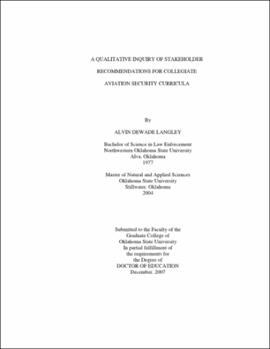| dc.contributor.advisor | Kutz, Mary N. | |
| dc.contributor.author | Langley, Alvin DeWade | |
| dc.date.accessioned | 2013-11-26T08:32:17Z | |
| dc.date.available | 2013-11-26T08:32:17Z | |
| dc.date.issued | 2007-12 | |
| dc.identifier.uri | https://hdl.handle.net/11244/7189 | |
| dc.description.abstract | Scope and Method of Study: Aviation Security Stakeholder Qualitative Interviews. | |
| dc.description.abstract | The current world environment and the challenges of the future demand an efficient and effective aviation security system. Development of intellectual capital to support that system must be based on strong academic curricula grounded in the life experiences and academic pursuits of its current stakeholders across three distinct disciplines: security, aviation and education. The purpose of this study was to develop a set of stakeholder driven recommendations for aviation security certification, degree programs, and specific curricula. Three broad research questions supported the findings of this study related to stakeholder recommended skill sets, core knowledge bases, and specific course work for collegiate aviation security programs. A purposive sample of 14 stakeholders from a variety of international aviation security professions was selected for interview using an Interview Guide of 16 questions. The data was analyzed using Hyper-Research software. Connections were made between common disciplines, themes, and linkages. | |
| dc.description.abstract | Findings and Conclusions: | |
| dc.description.abstract | Skills sets predominantly identified by the majority of stakeholders fell into one of three broad categories: thinking, communication, or relationship skills. Recurring themes in the study surfaced the importance of incorporating risk management, interpersonal communications, business concepts, global perspectives, cultural studies, and analytical thinking not only to degree programs but to be woven into the fabric of specific coursework. Program design considerations which surfaced in the study included: flexibility to maintain currency in the industry; accessibility through online, distance learning and hybrid course formats; lifelong learning or continuing education components to keep certificates and degrees current in a rapidly changing field. | |
| dc.description.abstract | Recommendations of the study were based on growth in projected demand and included three Langley models: Aviation Security Certification Program, Aviation Security Bachelor of Science Degree; and the Aviation Security Master of Science Degree Program. A number of additional recommendations were offered based on stakeholder comments related to funding, grants, and future research. | |
| dc.format | application/pdf | |
| dc.language | en_US | |
| dc.rights | Copyright is held by the author who has granted the Oklahoma State University Library the non-exclusive right to share this material in its institutional repository. Contact Digital Library Services at lib-dls@okstate.edu or 405-744-9161 for the permission policy on the use, reproduction or distribution of this material. | |
| dc.title | Qualitative inquiry of stakeholder recommendations for collegiate aviation security curricula | |
| dc.contributor.committeeMember | Marks, Steven Ken | |
| dc.contributor.committeeMember | Bliss, Timm J. | |
| dc.contributor.committeeMember | Davis, Charles Robert | |
| osu.filename | Langley_okstate_0664D_2504.pdf | |
| osu.accesstype | Open Access | |
| dc.type.genre | Dissertation | |
| dc.type.material | Text | |
| dc.subject.keywords | aviation | |
| dc.subject.keywords | curricula | |
| dc.subject.keywords | security | |
| dc.subject.keywords | risk | |
| dc.subject.keywords | threat | |
| dc.subject.keywords | terrorist | |
| thesis.degree.discipline | Applied Educational Studies | |
| thesis.degree.grantor | Oklahoma State University | |
